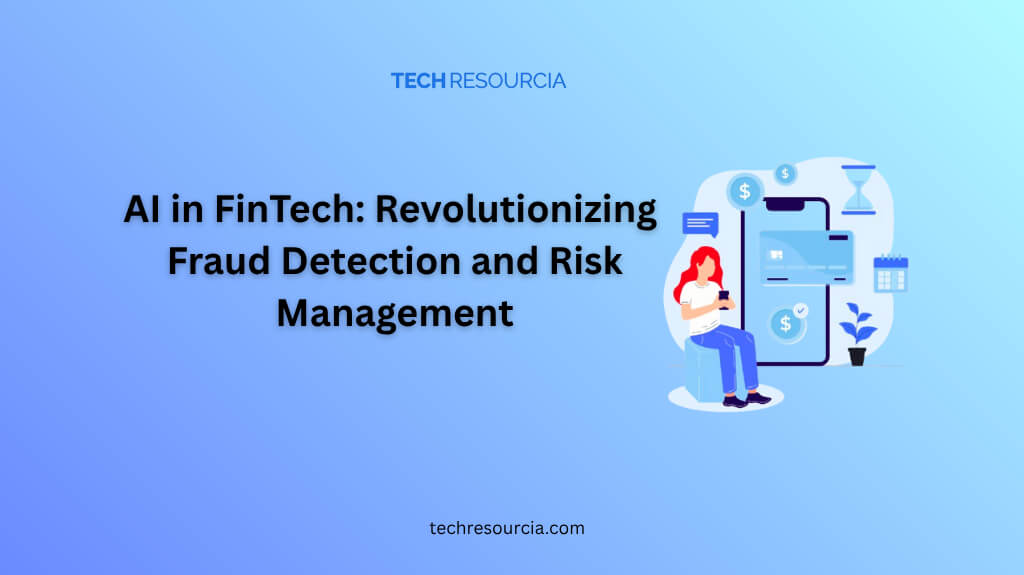In today’s rapidly evolving digital world, dealing with financial fraud has become more complex than before. As technology evolves, scammers are evolving too, using more sophisticated tactics to take advantage of vulnerabilities in financial systems. That has made it more challenging to tackle them. In fact, in the U.S.A. alone, financial fraud costs the economy around USD 138.3 billion.
Thus, with scammers elevating their scamming tactics, financial institutions and businesses are looking for effective ways to combat fraud and streamline risk management. This is where AI or Artificial Intelligence comes in as a game-changer.
By leveraging the power of AI, the FinTech sector can evaluate as well as assess vast amounts of data to identify anomalies in real-time. It can be said that Artificial Intelligence is revolutionising how financial institutions detect and mitigate risks.
In this blog, you will explore how Artificial Intelligence is transforming fraud detection and risk management within FinTech.
The Top AI Technologies for Fraud Detection and Risk Management
The FinTech sector depends on advanced and high-rated technologies to manage risks and detect fraud effectively. The key technologies include:
- Big Data Analytics
Big data is an important factor in the analysis of large amounts of data. It helps the systems to provide great insights through the analysis of customer data. The core aim is to ease fraud detection and enhance risk profiling.
- Deep Learning
This technology is a branch of AI that enables enhancing the performance of fraud detection systems over time. Learning on an enormous scale enables systems to distinguish between legitimate and suspicious activity and identify complex patterns with great efficiency.
- Robotic Process Automation (RPA)
RPA helps automate the various repetitive tasks, like compliance checks and data entry. As a result, it lowers the chances of human errors and frees up professionals for other strategic tasks or more complex activities.
How AI Helps in Fraud Detection?
Today, as most financial transactions take place digitally, the frequency and sophistication of fraud have increased. As a result, the traditional systems often fail to detect them, leading to financial losses and reputational damage.
However, the use of AI makes it easier for financial institutions to effectively and efficiently handle such issues. Delve into the prominent ways Artificial Intelligence simplifies fraud detection!
- Behavioral Analysis
The behavior of users can speak volumes about their intent and help detect potential compromise. Yes, you read it right! Therefore, Artificial Intelligence analyzes user behavior patterns like transaction habits, login times, and location to detect fraudulent activities in the account.
- Machine Learning Algorithms
These algorithms are capable of collecting information from historical data and providing an idea of what the normal behavior pattern of users is. As a result, identifying potential deviations and flagging fraud becomes easier.
- Natural Language Processing
Natural Language Processing (NLP) scans chats, emails, and texts to determine the usage of fraud-related keywords. They make it easier to identify suspicious communication between users. Recent statistics state that 48% of businesses are now taking advantage of technologies such as machine learning, predictive analytics, and natural language processing to facilitate data-driven decisions.
How AI Assists in Risk Management?
The predictive capabilities of Artificial Intelligence prove to be a game-changer for the FinTech sector. It not only empowers the financial institutions to predict market volatilities but also enables them to manage portfolios and assess creditworthiness easily. Take a look at the key ways AI helps in risk management in the FinTech sector!
- Real-Time Risk Analysis
AI consistently monitors the fluctuations in the financial market and keeps a tab on the movement of assets. This approach allows it to deliver real-time data relating to potential financial threats.
Moreover, the AI systems assess different economic indicators, price volatility, and geopolitical events to identify high-risk scenarios. All these can help financial institutions to proactively respond to potential risks and leverage appropriate strategies to minimize losses.
- Portfolio Risk Assessment
Artificial Intelligence plays a vital role in evaluating investment portfolios through the analysis of market trends, asset diversification, and risk exposure. The core aim is to enable financial analysts to effectively identify potential risks related to different assets.
Also, the predictive modelling of AI recommends specific portfolio adjustments to lower risk exposure. As a result, financial investors are in a better position to make better, data-driven decisions while maximizing returns.
- Loan Default and Credit Risk Prediction
The increase in the number of loan defaulters is becoming a matter of concern for financial institutions. AI allows financial institutions to predict loan defaults through the assessment of the creditworthiness of borrowers. It does so by analyzing and evaluating their historical credit data, economic behaviors, and spending patterns.
Moreover, AI plays a significant role in assigning accurate credit scores. So, you can be rest assured of improved loan approval accuracy, enhanced risk mitigation strategies, and reduced non-performing assets.
- Stress Testing
AI is capable of simulating market crashes, financial crises, and economic downturns to perform comprehensive stress tests. The main goal is to evaluate the way in which investment strategies perform under stress conditions and allow investors to build contingency plans.
Artificial Intelligence systems also help in scenario modelling and empower businesses to identify vulnerabilities, assess resilience, and enhance risk management. Ultimately, it contributes to enhanced financial stability.
Benefits of Leveraging AI in Risk Management and Fraud Detection
Are you still wondering why the FinTech industry must rely on AI for risk management and fraud detection? If so, take a look at the benefits the technology offers!
- Exceptional Efficiency
In this fast-paced era, speed matters a lot. AI systems are capable of processing millions of financial transactions in just a matter of seconds. As a result, you can detect unusual activities instantly and take appropriate actions to minimize losses.
- Predictive Analysis
Artificial Intelligence can forecast potential financial risks based on the analysis of historical data. So, proactive risk management becomes easier.
- Greater Accuracy
The advanced algorithms of AI help reduce manual error and limit the chances of false negatives or false positives. As a result, you can expect better accuracy in fraud detection and risk identification.
- Scalability
AI can easily accommodate the increase in financial transaction volumes. You can rest assured of optimal outcomes without any compromise on performance.
- Cost Savings
Automated fraud detection and risk management in the FinTech industry lowers the need for manual interventions. So, it becomes simple to lower operational costs significantly and enjoy greater savings.
Common Real-World Applications of AI in Risk Management and Fraud Detection
Ready to leverage AI in the FinTech sector? Before that, having an idea of its real-world applications is crucial. Read on to explore everything in detail!
- Credit Card Fraud
AI systems are used to monitor the credit card transactions of users continuously and identify unusual patterns. For instance, AI can detect activities like multiple high-value purchases or purchases in diverse locations in a short period of time and flag them as suspicious.
- Payment Fraud
AI is increasingly being used for the identification of potential deviations in user behavior during online transactions. By flagging suspicious activities, the technology helps promote secure online transactions.
- Insuarance Fraud
Through the analysis of transaction history and behavioral data, AI makes it possible to identify fraudulent claims. For instance, AI systems can flag multiple claims made by a policyholder in a short span of time.
- Loan Risk Scoring
Want to enhance the accuracy of different loan risk assessments? AI can make it possible! By analyzing vast data like spending habits and repayment behavior, the system assigns specific risk scores and improves accuracy significantly.
- Anti-Money Laundering Compliance
AI systems can effectively track and analyze financial transactions to identify money laundering patterns. This, in turn, enables the financial institutions to comply well with the anti-money laundering regulations.
- Identity Theft
AI can monitor and evaluate the login behavior of users in real-time. As a result, they alert users upon detection of anomalies and prevent identity theft incidents.
Potential Challenges of Implementing AI in the FinTech Industry
No doubt, the application of AI in the FinTech sector is beneficial. However, there are still certain challenges in its implementation that cannot be overlooked. Take a look at some of the common challenges!
- Bias in Algorithms
In order to properly train the AI systems, access to adequate data is essential. Inadequate data or a lack of diversity in data may result in the development of biases. This will eventually lead to inaccuracy in risk assessment.
- Data Privacy Concerns
Using AI in FinTech means providing the systems with access to large datasets. So, if things aren’t handled carefully, it may put sensitive data at risk and give rise to various privacy issues.
- Integration Complexity
Implementing AI in the FinTech sector is no easy feat. It demands significant investment of time, cost, and other resources. As a result, it may not be a feasible option for smaller financial institutions.
- Compliance and Regulatory Issues
Financial institutions need to comply with a lot of stringent rules and regulations. It can slow down the opportunities for innovation.
- Cybersecurity Risks
In this era, cybersecurity risks cannot be overlooked. The AI systems can become targets of sophisticated attacks.
Conclusion
AI isn’t a buzzword any longer. Instead, it has now become a necessity for the FinTech sector to effectively manage risks and combat fraud. The benefits that the technology offers to the financial institutions are indeed countless. Therefore, more and more FinTech companies are relying on modern AI systems to protect their users while gaining a competitive edge in the market.
AI allows financial institutions to identify anomalies, detect fraud, and take appropriate actions on time. All these will not only streamline operations but also enhance overall security and enable companies to win the trust and loyalty of customers. Ready to stay efficient, competitive, and compliant? It’s time to leverage the powerful AI systems, improve customer satisfaction, and boost business outcomes.

